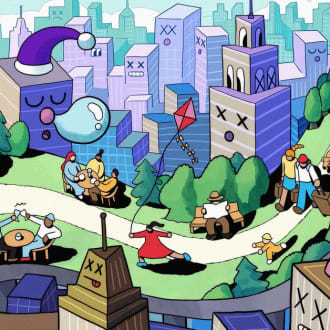
The Best Articles in Future Cities
The most useful articles and videos in Future Cities from around the web, curated by thought leaders and our community.
Refind focuses on timeless pieces and updates the list whenever new, must-read articles or videos are discovered.
Top 5 Future Cities Articles
At a glance: these are the articles that have been most read, shared, and saved in Future Cities by Refind users in 2024 so far.
- What Is Trauma-Informed Design?
- Paris Pulled Off the Dream of Many City Dwellers Around the World. It’s Been Thrilling—and Complicated.
- How to Build Cities That Aren’t Segregated by Income
- 8 Sustainability ideas that will change the world
- Spatial computing: What designers can learn from Italo Calvino’s book Invisible Cities
Videos
Watch a video to get a quick overview.
8 Sustainability ideas that will change the world
Diving into some of the most innovative ideas across retail, city planning, policy, technology and construction. Ideas that will truly change the way we thin...
These Stupid Trucks are Literally Killing Us
Save $20 on an annual membership to Nebula & watch this video and more ad-free: https://go.nebula.tv/notjustbikesEngineers, planners, politicians, and advoca...
How climate-friendly innovations can help cool our cities
As global temperatures rise, our cities are heating up, and that’s actually adding to the problem. As the FT’s Leslie Hook reports, by 2050, two-thirds of t...
We’re using our streets all wrong #shorts
The rise of the private automobile in American life and culture has dramatically changed how cities were designed, John Frazer, a mobility futurist, wrote fo...
These 8 cities are putting their focus on biking and walking — not cars
Even though cities have been centers of culture, ideas and industry since the Neolithic Revolution 12,000 years ago (!), today’s urban-centric global civilization is just a couple of hundred years …
What is ...?
New to Future Cities? These articles make an excellent introduction.
What Is Trauma-Informed Design?
Shared by 477, including Greater Greater Washington
«The growing awareness of the impact of the built environment on our health is one reason for the growth of trauma-informed design»
What Is The Future Of Cities?
As COVID-19 makes density a danger, we look at what's in store for cities.
How to ...?
How to build the city of the future, according to Ikea’s innovation lab
‘The Ideal City’ collects the most successful urban ideas from around the world, to serve as a sort of cookbook of best practices for city leaders.
Short Articles
Short on time? Check out these useful short articles in Future Cities—all under 10 minutes.
How to Build Cities That Aren’t Segregated by Income
Rich and poor are more separate in big cities than in smaller towns, but different urban design can help change that.
From London to New York: Can quitting cars be popular?
Cities around the world reveal surprising truths about getting the public on board with cutting car-use.
«Barcelona introduced free travel for three years for those who got rid of polluting cars,»
Can the Construction Industry Be Disrupted?
Construction is often maligned as the industry that technology left behind. Industry observers routinely deride the lack of technological sophistication in the construction industry, and have pigeon…
An Ecological Civilization is the Renaissance We’ve Been Waiting For
Six ingredients for a more resilient future
Long Articles
These are some of the most-read long-form articles in Future Cities.
The Evolution of Tunnel Boring Machines
Tunneling is an important technology for modern civilization, as a tunnel is often the only reasonable way to create a direct path between two points. When the Hoosac tunnel was completed in 1875, it…
Sphere and Loathing in Las Vegas
My night in front of the world’s largest LED screen
Spatial computing: What designers can learn from Italo Calvino’s book Invisible Cities
Spatial computing: What designers can learn from Italo Calvino’s book Invisible Cities to design for AR and VR
«By rearranging the elements, like combinations and permutations, you can construct dozens of cities with different characteristics.»
The future of cities, according to the experts
Cities aren’t going anywhere, but they do need to change.
Paris Pulled Off the Dream of Many City Dwellers Around the World. It’s Been Thrilling—and Complicated.
To twist a French idiom, now it’s vélo, boulot, dodo—bike, work, sleep.
Thought Leaders
We monitor hundreds of thought leaders, influencers, and newsletters in Future Cities, including:
What is Refind?
Every day Refind picks the most relevant links from around the web for you. Picking only a handful of links means focusing on what’s relevant and useful.
How does Refind curate?
It’s a mix of human and algorithmic curation, following a number of steps:
- We monitor 10k+ sources and 1k+ thought leaders on hundreds of topics—publications, blogs, news sites, newsletters, Substack, Medium, Twitter, etc.
- In addition, our users save links from around the web using our Save buttons and our extensions.
- Our algorithm processes 100k+ new links every day and uses external signals to find the most relevant ones, focusing on timeless pieces.
- Our community of active users gets the most relevant links every day, tailored to their interests. They provide feedback via implicit and explicit signals: open, read, listen, share, mark as read, read later, «More/less like this», etc.
- Our algorithm uses these internal signals to refine the selection.
- In addition, we have expert curators who manually curate niche topics.
The result: lists of the best and most useful articles on hundreds of topics.
How does Refind detect «timeless» pieces?
We focus on pieces with long shelf-lives—not news. We determine «timelessness» via a number of metrics, for example, the consumption pattern of links over time.
How many sources does Refind monitor?
We monitor 10k+ content sources on hundreds of topics—publications, blogs, news sites, newsletters, Substack, Medium, Twitter, etc.
Who are the thought leaders in Future Cities?
We follow dozens of thought leaders in Future Cities, including World Economic Forum, LSE Cities, Next City, Smart City Expo World Congress, UCL Urban Laboratory.
Missing a thought leader? Submit them here
Can I submit a link?
Indirectly, by using Refind and saving links from outside (e.g., via our extensions).
How can I report a problem?
When you’re logged-in, you can flag any link via the «More» (...) menu. You can also report problems via email to hello@refind.com
Who uses Refind?
450k+ smart people start their day with Refind. To learn something new. To get inspired. To move forward. Our apps have a 4.9/5 rating.
Is Refind free?
Yes, it’s free!
How can I sign up?
Head over to our homepage and sign up by email or with your Twitter or Google account.
Keep Learning
Learn something new, guided by experts. Deep Dives are carefully hand-curated series of time-tested articles and videos from around the web.
Get the big picture on your favorite topics.













